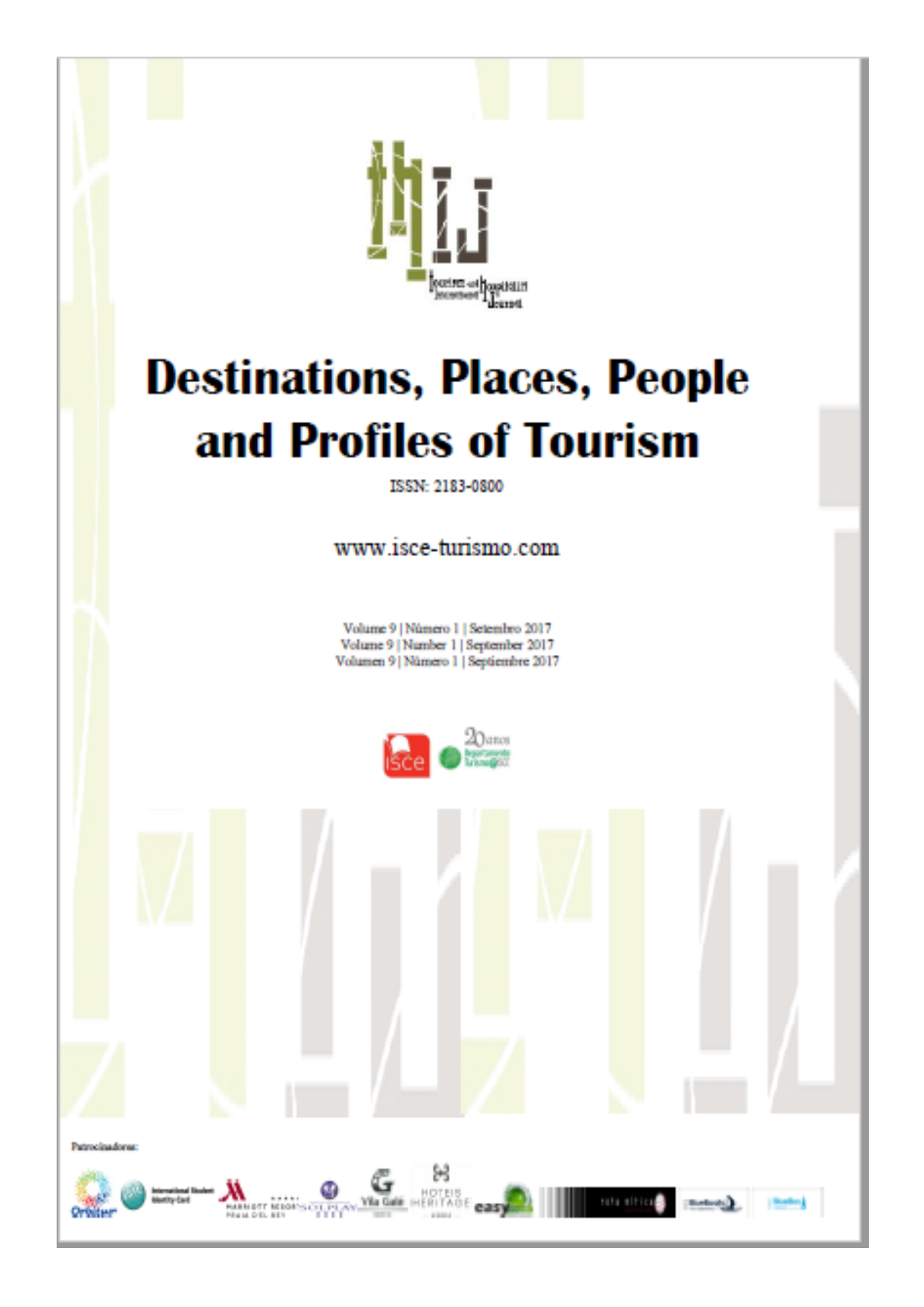Perceções dos residentes de Portalegre face ao Turismo
DOI:
https://doi.org/10.57883/thij9(1)2017.30430Palavras-chave:
Impactes, Perceções dos residentes, Turismo, PortalegreResumo
O turismo é um sector cujo desenvolvimento cria impactos nas comunidades acolhedoras, quer num sentido positivo, provocando alterações que melhoram a sua qualidade de vida, quer no sentido negativo, podendo ameaçar essa mesma qualidade de vida. Assim, os residentes de áreas com alguma procura turística podem desenvolver atitudes (positivas e negativas) perante o turismo, que estão, por sua vez, diretamente associadas aos impactes que este provoca nas áreas recetoras. Portalegre é uma cidade do Ato Alentejo que apresenta já alguma dinâmica turística, pelo que perceber as atitudes dos seus habitantes face a este fenómeno se revela crucial. Neste contexto, foi desenvolvido um trabalho de investigação sobre as perceções dos seus residentes face ao turismo, no âmbito da unidade curricular de Planeamento e Desenvolvimento do Turismo, da Licenciatura em Turismo da ESECS, cuja metodologia e principais resultados se apresentam neste artigo. Os resultados apresentados neste estudo resultam de uma análise quantitativa a 102 questionários válidos, obtidos através de aplicação direta na cidade de Portalegre. Duma forma global, este trabalho de investigação revela um reconhecimento dos residentes face aos impactes ambientais, sociais e económicos do turismo positivo.
Referências
Abdollahzadeh, G. & Sharifzadeh, A. (2012). Rural resident’s perceptions toward tourism development: A study from Iran. International Journal of Tourism Research, sp.
Amuquandoh, F. E. (2009). Residents’ perceptions of the environmental impacts of tourism in the Lake Bosomtwe Basin, Ghana. Journal of Sustainable Tourism, 18(2), 223 – 238.
Brida, J. G., Osti, L. & Faccioli, M. (2011). Residents’ perception and attitudes towards tourism impacts: A case study of the small rural community of Folgaria (Trentino – Italy), Benchmarketing: An International Journal, 18 (3), 359-385.
Chancellor, C., Yu, C. P. S. & Cole, S. T. (2011). Exploring quality of life perceptions in Rural Midwestern (USA) communities: An application of the core-periphery concept in a tourism development context. International Journal of Tourism Research, 13, 496-507.
Chuang, S.T. (2013) Resident’s attitudes toward rural tourism in Taiwan: A comparative viewpoint. International Journal of Tourism Research, 15, 152-170.
Confalonieri, M. (2011). A typical italian phenomenon: The “Albergo Diffuso”. Tourism Management, 32, 685-687.
Cooper, C., Fletcher, J., Fyall, A., Gilbert D. & Wanhill, S. (2007). Turismo: Princípios e práticas (3ª.ed.). Porto Alegre: Bookman.
Cunha, L. (2006). Economia e política do turismo. Lisboa: Editorial Verbo.
Das, B. R. & Rainey, D. (2010). Agritourism in the Arkansas Delta Byways: Assessing the economic impacts. International Journal of Tourism Research, 12, 265-280.
Eusébio, M. C. (2006). Avaliação do impacto económico do turismo a nível regional: O caso da região central de Portugal. Tese de Doutoramento, Universidade de Aveiro – Departamento de Economia, Gestão e Engenharia Industrial: Aveiro.
Fleischer, A. & Felsenstein, D. (2000). Support for rural tourism: Does it make a difference?, Annals of Tourism Research, 27 (4), 1007-1024.
Ferreira, I. C. N. (2006). Os impactos sociais, econômicos e culturais do turismo em Guaramiranga. Revista do Turismo.
Inskeep, E. (1991). Tourism planning an integrated and sustainable development approach. New York: Van Nostrand.
Instituto Nacional de Estatística (2016). Anuário Estatístico da Região do Alentejo, INE: Lisboa.
Kausar, D. & Nishikawa, Y. (2010). Heritage tourism in rural areas: Challenges for improving socio-economic impacts. Asia Pacific Journal of Tourism Research, 15 (2), 195-213.
Látková, P. & Vogt, C. (2012). Residents’ attitudes toward existing and future tourism development in rural communities. Journal of Travel Research, 51 (1), 50-67.
Mathieson, A. & Wall, G. (1990). Tourism: Economic, physical and social impacts. Logman Scientific &Technical.
Mbaiwa, J. (2011). Changes on traditional livehood activities and lifestyles cawsed by tourism development in the Okavango Delta. Botswana. Tourism Management, 32, 1050-1060.
McGehee, N. (2007). An agritourism systems model: A weberian perspetive. Journal of Sustainable Tourism, 15 (2), 111-124.
Milheiro, E., Eusébio, C. & Kastenholz, E. (2014). Turismo e desenvolvimento económico em territórios rurais: Uma revisão da literatura. Revista Turismo e Desenvolvimento/Journal of Tourism and Development, 21/22 (4), 133-145.
OMT (1997). Medidas prácticas para los destinos. Madrid: OMT.
OMT (2003). Turismo internacional: Uma perspectiva global (2. ed.). Porto Alegre: Bookman.
Page, S. J., Brunt, P., Busby, G. & Connel, J. (2001). Tourism: A modern synthesis, (1ª edição). London: Thomson Learning.
Sancho, A. (2001). Introdução ao turismo. Organização Mundial do Turismo. São Paulo: Roca.
Silva, L. (2012). Built heritage-making and socioeconomic renewal in declining rural areas: Evidence from Portugal. Etnográfica, 16 (3), 487-510.
Souza, C. A. M. (2009). Turismo e desenvolvimento: Perceções e atitudes dos residentes da Serra da Estrela. Dissertação de Mestrado, Universidade de Aveiro – Departamento de Economia, Gestão e Engenharia Industrial: Aveiro.
Publicado
Como Citar
Edição
Secção
Licença
Direitos de Autor (c) 2023 This work is licensed under a Creative Commons - Attribution 4.0 International (CC BY 4.0)

Este trabalho encontra-se publicado com a Licença Internacional Creative Commons Atribuição 4.0.
Este trabalho encontra-se publicado com a Licença Internacional Creative Commons Atribuição 4.0.






